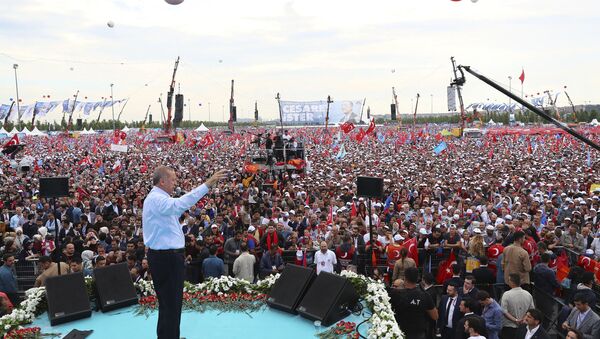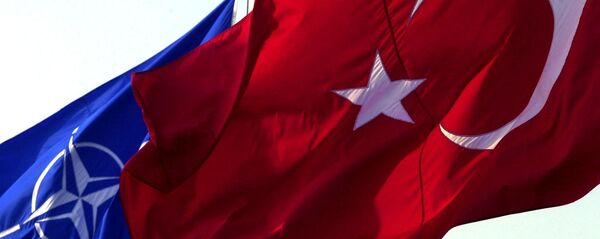Turkish general election held on June 24 consists of two separate votes, a presidential and a parliamentary one. Six candidates will run in the election: Erdogan, Muharrem Ince of the Republican People's Party (CHP), Selahattin Demirtas of Peoples' Democratic Party (HDP), Meral Aksener of the iYi (Good) Party, Temel Karamollaoglu of the Felicity Party, and Dogu Perincek of the Patriotic Party.
At the moment, Erdogan's Justice and Development Party (AKP) holds the majority in the parliament, while the CHP is the main opposition.
Re-Election for Erdogan
Erdogan has a strong base, which makes his victory likely, but not in the first round, a fellow for the Middle East at the Baker Institute for Public Policy at Rice University, Dr. A. Kadir Yildirim, told Sputnik.
"President Erdogan will most certainly win the election. He has a solid base, which will carry him to the presidency despite all the controversy and polarization surrounding Erdogan and his party, AKP. It will most likely go to the second round, however," Yildirim said.
To win in the first round, a candidate would need to secure 50 percent plus 1.
A research scholar at the Baker Institute for Public Policy at Rice University, Dr. Abdullah Aydogan, agrees that the second round is possible.
"Looking at the polls overall, what I predict is that, there will be a second round between CHP's Ince and Erdogan. Who will win in the second round will be mostly determined by the Ince's strategic move right after the first round," Aydogan told Sputnik.
READ MORE: Can Erdogan Retain Power? Turkey on Verge of Presidential Election
On the other hand, Director of European Studies at SETA Foundation Dr. Enes Bayrakli believes that Erdogan is likely to secure a victory in the first round, although the expert agrees that a second round if it does take place, will be between Erdogan and Ince.
"I think that there is a very high probability that President Erdogan will win in the first round. There is just a small possibility for the second round, but it is very law I think. And if there is a second round, I think there will be Muharrem Ince from the CHP Party and President Erdogan but I do not think that it will come to this," Bayrakli said.
Foreign Policy After Potential Re-Election
According to Yildirim, the Turkish foreign policy would not undergo any major changes if Erdogan got re-elected. The focus would likely remain on a Kurdish region in neighboring Syria.
"Turkish foreign policy in Syria is shaped by Turkey’s concern with an autonomous Kurdish region within Syria once the conflict in the country is resolved. Until that is achieved, Erdogan has little incentive to change course in foreign policy," Yildirim said.
READ MORE: Erdogan Calls on Turks to 'Give West Lesson' at Upcoming Presidential Election
The issue of Turkey's membership of the European Union is unlikely to move forward, under Erdogan's continued presidency, although it is important to the AKP and the president himself, the expert argued.
"The EU membership is rhetorically important for Erdogan and AKP; the membership process (not the membership itself) is an indicator of the AKP government’s democratic credentials, for the party. But it is clear that the process is not going anywhere for a variety of reasons," Yildirim said.
Bayrakli, similarly, said major changes in the foreign policy were unlikely if Erdogan was re-elected.
"I expect that Turkey will continue cooperating with Russia in Syria and also in other areas, but also we will keep our relations with NATO and other countries including the United States," the expert said.
Parliamentary Election
In terms of the parliamentary vote, the status of the ruling AKP party and its ally Nationalist Movement Party (MHP) is likely to depend on how well the HDP does in the polls, Yildirim told Sputnik.
"The fate of the People’s Alliance will depend on how the Kurdish HDP will perform at the polls. As in previous elections, if the HDP obtains 10 percent of the national vote or more (needed to secure any representation in the parliament), it will directly undermine the AKP’s parliamentary representation. The break-away nationalist iYi Party will hurt the AKP to some degree as well," the expert said.
"The real mistake, in my opinion, was leaving the HDP out of the alliance. It is the HDP that could really shake things up for the opposition, if there is any genuine interest in mounting a challenge to the AKP’s 16-year dominance in Turkey," Yildirim said.
Bayrakli believes that the AKP and the MHP are likely to secure the majority.
"The problem with the opposition [alliance] is that they don't have a common agenda. They have only a common goal which is to get rid of Erdogan," the scholar said.
READ MORE: Erdogan: Turkey Plans to Accept 40Mln Tourists in 2018
Aydogan has been slightly less certain of the AKP and the NHP's chances to secure a majority.
"I believe MHP and AKP has some chance of getting the majority in the parliament. But what I see is that it is low, particularly if HDP passes threshold," the expert argued.
Nevertheless, the participation of smaller parties and their potential gains will be able to "change the distribution of political influence," Aydogan said.
The views and opinions expressed by the speakers do not necessarily reflect those of Sputnik.





